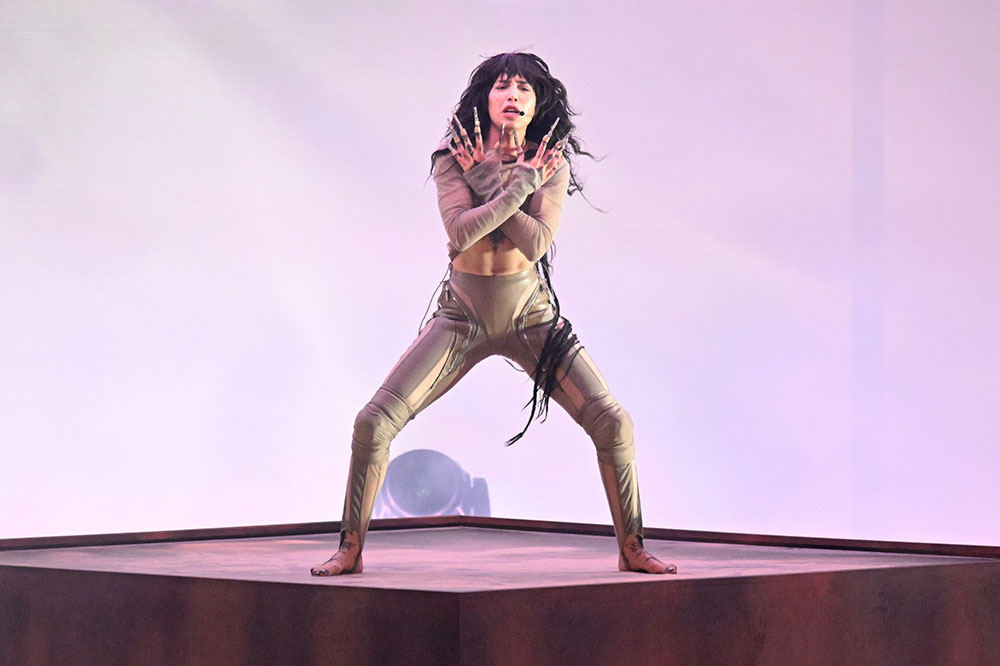Under pulsating lights, a woman in a sand-toned bodysuit lies between two giant light boxes. As an electro beat kicks in and the upper box rises, the figure gyrates upwards with it as she starts to sing, revealing long witchy talons and strands of tangled black hair. She is barefoot, her tattoo-covered hands twirling in front of her. The look is part-gothic horror, part-Dune, but it’s mainly a homage to her Moroccan nomadic heritage. The production is stripped back, the vocals spine-tingling and flawless.
This is Loreen, Sweden’s 2023 Eurovision entry, performing her song Tattoo. She is the favourite to win, having secured the trophy before in 2012. With her North African roots and Scandinavian upbringing, her blend of hypnotic dance-pop with folky undertones, she embodies modern Europe and everything Eurovision has become. But aesthetically she could hardly be further from the first contest in 1956 and its winner, Switzerland’s Lys Assia, with ‘Refrain’, a classic French chanson. Coiffed and clad in a demure Dior-like gown, with a full orchestral backing, she and singers like her were for years the Eurovision light-entertainment standard.
Lys Assia performing for Switzerland at the inaugural Eurovision Song Contest in 1956. Photo: Sepia Times/Universal Images Group via Getty Images

Since 1956, Eurovision has been through countless reinventions to survive, shapeshifting to fit the pop cultural landscape, but also mirroring the ebb and flow of European geopolitics. The fall of the Soviet Union brought new eastern bloc nations into the fold; Turkey and Russia were in then out again, in protest at its growing LGBT emphasis – epitomised by 2014’s bearded drag queen Conchita Wurst. Rarely explicitly political, the contest projects a soft power – a beacon of liberalism; later an inclusive space for gay and trans performers; today, co-hosted with Ukraine, a more concretely anti-war defiance.
Eurovision can broadly divided into three eras. First the easy listening of the 1950s and early ’60s, held in theatres with live orchestras and flower-bedecked stages; audiences in black tie and furs. Then the Boom-Bang-a-Bang pop and Abba rock of the later 1960s and ’70s, crystallising into glossy, Americanised pop by the millennium, when orchestras made way for sound systems and flashy lighting in cavernous arenas.
In the past two decades, as emerging nations gained confidence, the Eurovision style has coalesced into what the BBC describes as folk-disco. This means feathers and bodysuits, crowns and capes, drums and novelty grannies, pounding beats and haunting choruses, and countries unafraid to sing in their native language while still rocking J-Lo-style dance routines. Audiences wear glitter rather than being decked in jewels, more like a Pride celebration than the gala nights of old. But despite the glitz, what it is – and what the UK has got so wrong for many years, when we were sending in novelty acts and has-beens – is deadly serious.
Susan Sontag defined ‘high camp’ as having a serious intent: ‘You can’t camp about something you don’t take seriously. You’re not making fun of it, you’re making fun out of it.’ The UK had failed to notice the threat of the eastern bloc countries entering their best talent to the competition. After our last win in 1997, with the decidedly mum-rock Love Shine a Light by Katrina and the Waves, we began to lose out to these brash, big-haired incomers and wrongly responded with what Sontag called ‘low-camp’. But every year we tumbled down the rankings. The contest became a poison chalice for credible UK acts, creating a cheesy-pop death spiral – from naff pop duo Jemini with their ‘nul points’ entry ‘Cry Baby’ to the archly kitsch Scooch dressed as air stewards. And so on. Europe wasn’t buying it and even Bonnie Tyler couldn’t save us. We convinced ourselves we were hated by the rest of Europe.
Mae Muller, representative for the United Kingdom, at the dress rehearsal for the Eurovision Song Contest 2023. Photo: Paul Ellis/AFP

In fact, all we needed was a great song. Last year salvation came in a long-haired surfer dude who had risen to prominence on Tik-Tok. Sam Ryder’s ‘Spaceman’ nodded to Bowie and Elton. He looked and sounded classy and exuded positivity. As the points started to roll in, and we climbed the leader board to finish second, the curse had been lifted. So to Liverpool. Aesthetically we have found the formula, the Goldilocks zone of camp, with the BBC replicating its successful formula for Drag Race UK in trailers – knowingly referring to the heritage of British pop culture; cheeky but not tacky.
Mae Muller’s UK entry ‘I Wrote a Song’ has more of a recognisable sound than Loreen’s mesmerising solo, but the balearic-inflected breakup song is fiendishly catchy and she is tipped to do well. She is credible, assured, having fun but taking Eurovision seriously. As Gen Z embraces queer culture and retro Y2K pop, is it too much to think the contest could finally be cool?



